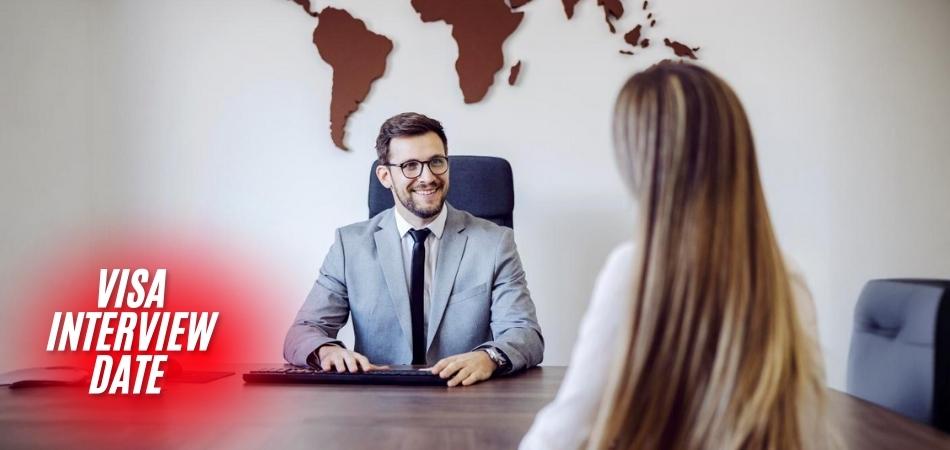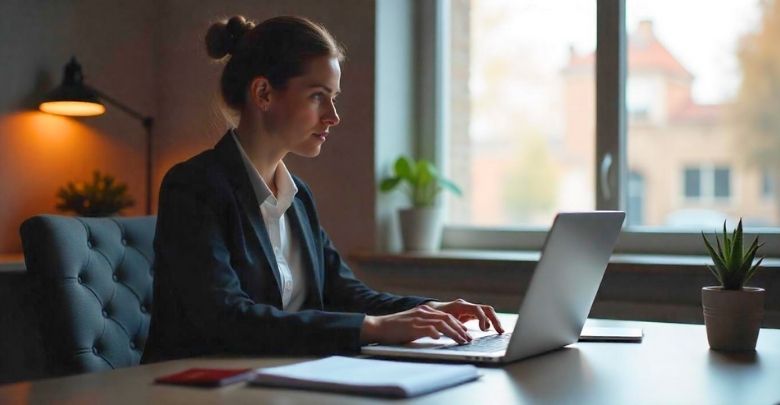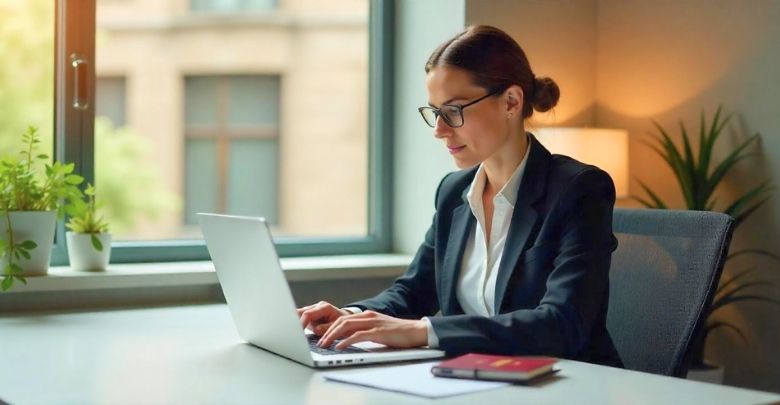When planning to attend a conference in the United States, securing a USA conference visa is an essential step. However, one common concern is about the timeline involved in getting a visa interview date. If you’re asking: How long does it take to get a USA conference visa interview date? The answer depends on several factors.
The time to get a USA conference visa interview date varies based on visa type, embassy workload, and applicant’s country. While some applicants may secure an interview date within a few weeks, for others, the process could take several months.
To ensure a smooth process and avoid delays, make sure you plan ahead. Keep reading to explore key factors and tips for scheduling your visa interview efficiently.
How Long Does It Take to Get a USA Conference Visa Interview Date?
Obtaining a USA conference visa is crucial for attending events, but timing is equally important. Many applicants often wonder about the waiting time for an interview date. Being aware of the factors involved will help you better prepare for the visa process.
Visa Type Matters
The type of visa you are applying for affects the time to secure an interview. Non-immigrant visas for business and tourism can have different processing times. Applicants for B1/B2 visas, typically used for conferences, may face varying wait times. The nature of the visa application also influences how long it takes to get an interview date.
Some visa categories, such as student visas or work-related visas, may require additional documentation. These processes often take longer due to the level of scrutiny involved. You should check your specific visa category and understand the expected timeline. A conference in USA typically requires a B1/B2 visa, which may have a shorter waiting time.
Embassy Workload
Embassy workload significantly impacts the time it takes to get an interview. During peak seasons, such as summer or holidays, the demand for visa appointments increases. This results in longer waiting times, as many applicants are vying for limited slots. Each embassy handles applications differently, which can lead to inconsistencies in wait times.
In times of high demand, embassies may take several months to schedule an interview. The volume of applications can create delays, making it harder to secure an appointment quickly. Note that some embassies may prioritize certain applicants based on the urgency of their requests. Consequently, workload is a major factor in determining how long you will wait.
Applicant’s Country
The applicant’s home country plays a role in the waiting period for an interview date. Countries with higher numbers of applicants typically experience longer processing times. Additionally, embassies in regions with more significant security concerns may require additional checks. These factors can result in varying wait times from one country to another.
Visa interview availability can also differ based on the local embassy’s resources. In some countries, applicants may experience delays due to limited staff or high application volume. These conditions contribute to the unpredictability of the interview scheduling process. Therefore, your country of residence can significantly affect the overall timeline.
Consular Services and Staffing
The efficiency of consular services impacts how long it will take to secure an interview. Some U.S. embassies are better equipped to handle large volumes of applications. Others may be understaffed, leading to delays in processing. The availability of appointments can be influenced by how well the embassy is organized.
Staffing shortages, whether due to funding or other issues, can slow down the process. In regions where there are fewer personnel available to handle applications, waiting times increase. Furthermore, the embassy’s working hours or holidays can contribute to delays. These factors make it important to consider when planning your conference trip.
External Factors
External factors, such as political instability or health crises, can also delay the visa process. Unexpected events like natural disasters or public health emergencies can lead to embassy closures. These unforeseen situations may prevent visa interviews from being scheduled on time. As a result, applicants may face extended waiting times.
Make sure you stay informed about any local or global issues that could affect your visa application. Even factors beyond the embassy’s control can influence the interview scheduling process. This makes it vital to plan ahead and account for possible delays.
Best Ways to Check the Current Wait Time for USA Conference Visa Interview
When planning to attend a conference in the USA, knowing the wait time for a visa interview is essential. Delays can impact your schedule, so be sure to gather accurate information. For better preparation for a USA visa interview, you can track current wait times in several ways. The following is a detailed explanation:
Check the Official U.S. Embassy Website
The U.S. embassy website provides up-to-date information on visa interview wait times. It includes details specific to your country and type of visa. You can find wait time data for different visa categories. This official source is reliable and regularly updated to reflect the latest trends.
Each U.S. embassy updates its page based on local conditions and demand. Therefore, the waiting time can vary depending on your location. Regularly visiting the embassy’s website helps you stay informed. It also provides helpful tips for scheduling and preparing your interview.
Use the Visa Appointment Service
The Visa Appointment Service is another official tool to check current wait times. You can access this service online, specific to your country. It offers detailed information about the availability of appointment slots. The site also allows you to book appointments for the visa interview once you’re ready.
This service includes wait times for both non-immigrant and immigrant visas. It is a practical way to track how long it will take to secure an interview date. The Visa Appointment Service also provides useful guidance for filling out your visa application. Using it allows you to be more prepared when applying for a USA conference visa.
Explore Third-Party Websites
Several third-party websites track visa processing times and provide updates on wait times. These websites may gather data from multiple sources and offer insights based on user experiences. They often share wait time averages for specific embassies or regions. While not official, these resources can offer an additional perspective.
Be cautious when relying on third-party websites for information. Some may provide outdated or inaccurate details. However, they can still help you estimate wait times and plan your application. Always cross-check the information with official sources for accuracy.
Ask for Updates via Social Media
Many U.S. embassies and consulates use social media to communicate with applicants. They often post updates about visa processing times and delays. Checking these platforms can give you real-time information on any changes. Social media is an excellent way to stay connected and informed about visa procedures.
These channels often post important notices about wait times, especially during busy seasons. Following your local U.S. embassy on social media ensures you receive relevant updates. Direct messaging or commenting on posts can also help get specific information. It’s a convenient way to interact with the embassy and learn about any issues.
Contact the Embassy Directly
For more detailed or personalized information, you can contact the U.S. embassy directly. Many embassies offer phone or email support for visa-related queries. By reaching out, you can ask for specific details regarding wait times in your region. This ensures you receive the most accurate and up-to-date information.
Embassies may take time to respond, especially during high-demand periods. It’s a good idea to plan and allow for any delays in communication. Despite potential wait times, contacting the embassy ensures you get reliable information. Be sure to provide clear details about your visa type and location when inquiring.
Track Processing Through the CEAC System
The Consular Electronic Application Center (CEAC) offers a way to track your visa status. Once you’ve submitted your application, you can monitor its progress online. The system provides updates about your case and interview date availability. You can log in to check if your interview appointment is confirmed or still pending.
The CEAC system is a useful tool for applicants who have already started their visa process. It helps track your application’s progress and offers transparency. You can prepare for a USA visa interview with peace of mind by carrying out regular checks. Keep your CEAC login details handy to monitor any changes in your visa status.
What Are the Peak Seasons for US Conference Visa Applications?
Applicants for conference visas to the USA should be aware of the peak seasons. During busy times, visa processing can take longer. Being aware of these periods helps you avoid delays and secure your interview slot on time. Here are the details about peak seasons for US conference visa applications:
Spring and Summer Months
Spring and summer months are peak seasons for conference visa applications. Many conferences are scheduled during these months due to better weather and availability. The high demand during this time causes longer wait times for interviews. You should apply well in advance to avoid delays.
Holiday Seasons and Year-End
The holiday season, especially around Thanksgiving and Christmas, affects visa application processing. Embassies tend to have reduced staffing and limited appointments during these times. Many conferences are also scheduled after the holiday break, leading to a surge in applications. As a result, this period can see extended wait times for interview dates.
Early Fall Conference Season
Early fall, from September to October, is another busy period for conference visa applications. Many academic and business conferences take place during these months. The increased volume of applications results in longer processing times. Applying early in the season can help reduce delays caused by high demand.
Spring Break and Summer Holidays
Spring break and summer holidays bring increased visa applications for U.S. conferences. Many students, professionals, and researchers plan trips during these times. The influx of applications creates a high demand for interview slots. Applying ahead of time helps ensure you get your interview date without unnecessary delays.
Political and Economic Events
Political or economic events in the U.S. can influence peak seasons for conference visa applications. International conferences related to such events often attract a large number of applicants. These events may lead to higher-than-usual demand for visa appointments. It’s advisable to stay informed about global events that could affect visa processing.
Can You Expedite the Process for USA Conference Visa Interview?
Yes, it is possible to expedite the process for a USA conference visa interview. However, this option is not available to all applicants. Expedited processing is generally reserved for specific circumstances, such as urgent travel needs or an important event.
To request an expedited interview, you must show proof of urgency. This could include an invitation to a time-sensitive conference or critical business event. The U.S. embassy may grant expedited processing based on the provided evidence, but it depends on their assessment.
Keep in mind that expedited requests are not always approved. The embassy will evaluate the situation and make a decision based on its criteria and resources. It’s important to apply early, provide clear reasons for needing an expedited interview, and understand that approval is not guaranteed.
Tips to Secure an Earlier USA Conference Visa Interview Slot
When applying for a USA conference visa, securing an early interview slot is often a priority. High demand and limited availability can cause delays in scheduling. Here are some tips to help you get an interview slot sooner:
Apply Early
The sooner you apply for a visa, the better your chances of securing an early interview slot. Visa processing times can vary, so early application reduces the risk of long delays. By submitting your application well in advance, you can schedule your interview before peak seasons. This gives you more flexibility in choosing your interview date.
Monitor Appointment Availability
Keep a close eye on appointment availability through the U.S. embassy’s online portal. Appointment slots may open unexpectedly due to cancellations or new availability. Regularly checking for new openings increases your chances of securing an earlier slot. The more often you check, the better your chances of getting a sooner interview date.
Request an Expedited Interview
If your conference is time-sensitive, you can request an expedited visa interview. This request must be supported by evidence, such as an urgent invitation or a critical event. The embassy may grant your request if your situation qualifies for expedited processing. However, not all requests are approved, so be sure to provide strong reasoning.
Complete Your Application Quickly
Completing your visa application quickly and accurately is crucial for securing an earlier interview. Delays in submitting documents or information can push back your interview date. Make sure all required forms and supporting documents are ready before scheduling the interview. Having everything prepared ahead of time will speed up the overall process.
Be Flexible with Your Interview Location
If possible, consider applying for a visa at a U.S. embassy in a nearby city. Some embassies have shorter wait times than others, depending on their workload. You may find that an alternate embassy can offer a quicker interview date. Researching nearby embassy options could provide a faster solution for your visa needs.
Stay Organized
Organization is key to ensuring a smooth visa process. Keep track of all deadlines, appointments, and required documentation. Make sure to have all documents for USA visa interviews ready in advance, such as your conference invitation. Staying on top of your application timeline helps prevent any unnecessary delays.
Reach Out for Assistance
If you’re struggling to secure an earlier slot, don’t hesitate to contact the embassy for guidance. Some embassies provide assistance in rescheduling or advising on available slots. While they may not always be able to speed up the process, their support could help you find earlier opportunities. Clear communication with the embassy can make a difference in your visa journey.
Answers to Common Questions
Below are some frequently asked questions about the USA conference visa interview process. These questions cover various aspects of the visa timeline and factors that can influence how long it takes to get an interview date.
Can I Change My Interview Date Once It’s Scheduled?
Yes, you can change your interview date, but this often depends on the embassy’s policies. Some embassies allow you to reschedule through their online portal, while others may require direct contact. Make sure you do this as soon as possible to avoid losing your appointment.
What Happens if I Miss My Scheduled USA Visa Interview?
If you miss your interview, you may need to reschedule it. Depending on the embassy, this may require waiting for the next available appointment. You might also be asked to provide a valid reason for missing the interview.
How Far in Advance Should I Apply for an USA Conference Visa?
It’s advisable to apply for your USA conference visa as early as possible, ideally 3 to 6 months before the event. Early application allows you to avoid delays caused by high demand during peak seasons. Additionally, applying ahead gives you ample time to gather the required documents and schedule the interview.
Can I Attend the Interview Without Having the Conference Invitation Letter?
No, the invitation letter is an essential document required to attend the interview. It serves as proof that you are attending a legitimate conference and helps the embassy evaluate your purpose of travel. Without it, your application may not be processed.
Do All U.S. Embassies Follow the Same Visa Processing Timeline?
No, visa processing timelines can vary by embassy. Different embassies have different workloads, staffing, and security concerns that influence the wait times. It’s important to check the processing times specific to the embassy where you plan to apply.
What Happens if My USA Conference Visa is Denied?
If your visa is denied, you will receive a letter explaining the reason. Common reasons for denial include missing documents, insufficient evidence of ties to your home country, or concerns over the authenticity of your application. You can reapply after addressing the issues raised by the embassy.
Bottom Line
Obtaining a USA conference visa interview date depends on several factors, including the type of visa, embassy workload, and your country of residence. When asking how long does it take to get a USA conference visa interview date, the answer varies, with wait times ranging from a few weeks to several months depending on these variables.
During peak seasons or busy periods, such as the holidays or summer, the wait times can be longer. To ensure a smooth process, applicants should plan, monitor appointment availability, and stay informed about any changes. Early applications, flexibility with locations, and clear communication with the Embassy can help reduce delays and increase the chances of securing an earlier interview date.








